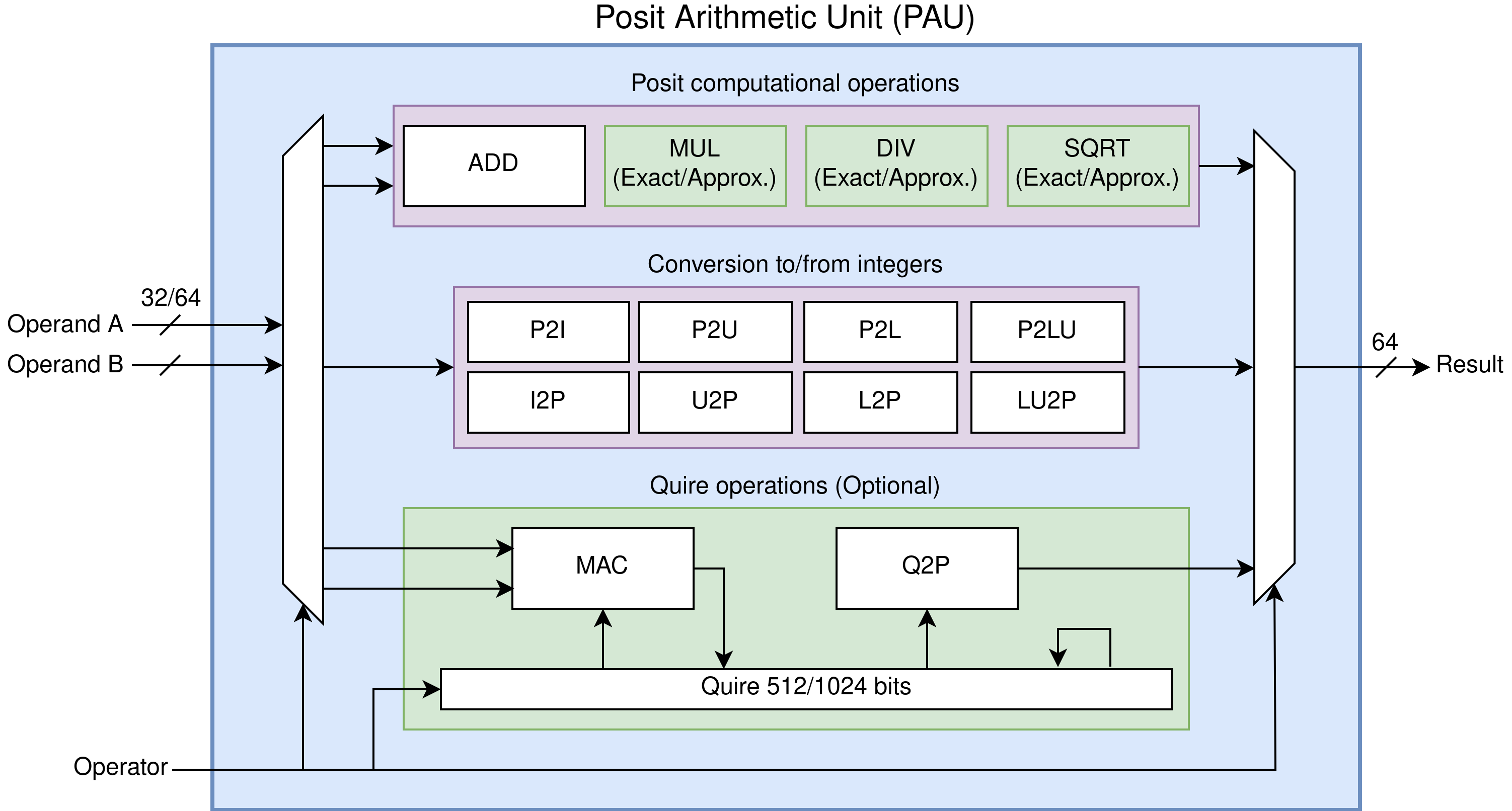PERCIVAL: Open-Source Posit RISC-V Core with Quire Capability
PERCIVAL is an application-level posit capable RISC-V core based on CVA6 that can execute all posit instructions, including the quire fused operations.
You can find the Xposit RISC-V custom extension for posit arithmetic used together with this repository here: https://github.com/artecs-group/llvm-xposit
You can find the original CVA6 repo with additional documentation here: https://github.com/openhwgroup/cva6
64-bit version (Big-PERCIVAL)
Here you can also find Big-PERCIVAL, an updated version of PERCIVAL which adds posit64 operations and increased flexibility in the PAU. You can read about it in our pre-print: https://doi.org/10.48550/arXiv.2305.06946
For the original PERCIVAL code switch to the posit-master branch. However, we recommend using the current default big-percival-main branch, as this also supports 32-bit posits.
Publication
If you use PERCIVAL in your academic work you can cite us:
D. Mallasén, R. Murillo, A. A. D. Barrio, G. Botella, L. Piñuel, and M. Prieto-Matias, “PERCIVAL: Open-Source Posit RISC-V Core With Quire Capability,” IEEE Transactions on Emerging Topics in Computing, vol. 10, no. 3, pp. 1241–1252, 2022, doi: 10.1109/TETC.2022.3187199.
D. Mallasén, A. A. Del Barrio, and M. Prieto-Matias, “Big-PERCIVAL: Exploring the Native Use of 64-Bit Posit Arithmetic in Scientific Computing.” arXiv [cs.AR], 2023. Available: http://arxiv.org/abs/2305.06946
@article{mallasen2022PERCIVAL,
title = {PERCIVAL: Open-Source Posit RISC-V Core With Quire Capability},
author = {Mallasén, David and Murillo, Raul and Del Barrio, Alberto A. and Botella, Guillermo and Piñuel, Luis and Prieto-Matias, Manuel},
year = {2022},
journal = {IEEE Transactions on Emerging Topics in Computing},
volume = {10},
number = {3},
pages = {1241-1252},
issn = {2168-6750},
doi = {10.1109/TETC.2022.3187199}
}
@misc{mallasen2023BigPERCIVAL,
title = {Big-PERCIVAL: Exploring the Native Use of 64-Bit Posit Arithmetic in Scientific Computing},
author = {Mallasén, David and Del Barrio, Alberto A. and Prieto-Matias, Manuel},
year = {2023},
month = may,
eprint = {2305.06946},
primaryclass = {cs.AR},
archiveprefix = {arXiv}
}
Posit Arithmetic Unit (PAU)
The top-level module of the PAU can be found in core/pau_top.sv. The individual arithmetic modules are in core/pau/. You can configure the PAU changing the parameters in core/include/ariane_pkg.sv.
FPGA synthesis
To generate the FPGA bitstream for the Genesys II board run make fpga. This will produce a bitstream file and memory configuration file in corev_apu/fpga/work-fpga/.
Programming the Memory Configuration File
- Open Vivado.
- Open the Hardware Manager and open the target board (Genesys II
xc7k325t). - Tools -> Add Configuratin Memory Device ->
xc7k325t. - Select Configuration Memory Part -> Spansion SPI flash
s25fl256sxxxxxx0. - Program the configuration memory device with the configuration file
ariane_xilinx.mcsgenerated incorev_apu/fpga/work-fpga/. - Press ok. Flashing will take a couple of minutes.
- Right click on the FPGA device -> Boot from Configuration Memory Device (or press the program button on the FPGA).
Booting linux
To prepare the SD card and boot linux follow the instructions available here. You can build your own posit applications and include them in the linux image following the instructions available here.
Acknowledgments
This work was supported in part by the 2020 Leonardo Grant for Researchers and Cultural Creators, from BBVA Foundation under Grant PR2003_20/01, in part by the Spanish MINECO, the EU(FEDER), and Comunidad de Madrid under Grants RTI2018-093684-B-I00 and S2018/TCS-4423, and in part by grants PID2021-123041OB-I00 and PID2021-126576NB-I00 funded by MCIN/AEI/ 10.13039/501100011033 and by “ERDF A way of making Europe”.
